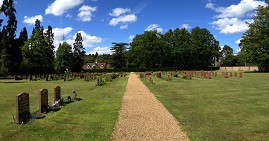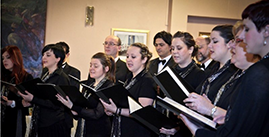
Vera Stanojlović
Vera Stanojlović, a longstanding member of the Serbian community in Britain recently celebrated her one hundredth birthday on the 14th October 2020. Covid restrictions meant that she was only able to celebrate with the five closest members of her family. However, her friends and family from across the world, sent her beautiful video messages which were collated and played to her on the day and so she did not feel that she had missed out because of the pandemic.
Vera was born on 14th October 1920 in Lazarevac, a small village some 60 kilometres from Belgrade. Her father was a priest, the 14th generation from his family and her mother was a school teacher, one of the first women school teachers in Serbia. She loved the freedom that being brought up in a small town gave her to roam the surrounding countryside, swim in the Kolubara river and play football with the town’s children.
After completing primary school in Lazerevac Vera went to secondary school in Belgrade and had just completed her first year on a pharmacy course at the university when war broke out. Vera returned to her home in Lazerevac for the duration of the war where she and her family had their home requestioned by the Germans and then the Russians. In these difficult times her father used his position to try and protect villagers from the excesses of the occupying forces, at times putting himself and his family at risk.
Once the communists gained power after the war the family were regarded as anti-communist because of their activity in the Democratic Party and Vera spent a short period in prison. Due to their precarious position Vera and other younger members of the family decided to leave the country during the elections in 1945 believing that they would return after a couple of weeks. On her second attempt Vera managed to escape to Trieste where she remained for a few months before moving to the refugee camp in Eboli and then to Naples. When the British left Italy she and other refugees were moved to a camp in western Germany. During her time in the camps Vera found work not only for herself but other members of her family. She worked in the camp administration, a hospital and a library.
In 1947 Vera came to Britain under the European Volunteer Workers scheme, where the British government recruited displaced persons to meet the need for labour in key occupations in industry and farming, as well as in the new National Health Service. Vera was recruited for a children’s hospital in east London, whilst her sister was sent to a cotton factory in Preston and her brother-in -law to agricultural work in the west country. Vera was a hard worker and because of this the matron in hospital in which she worked used her influence to bring the family together in London. She became part of the small Serbian community in London which consisted largely of members of the government in exile and people who came to Britain as volunteer workers. The Serbian community congregated around the Serbian Orthodox church in a house in Egerton Gardens in Knightsbridge, which Queen Marija had bought and donated to the Serbian community. The church was and community was led ably by Father Nikolić who became a close life-long friend. Initially there were only a dozen people in the congregation but it grew considerably over the next few years with the arrival of more displaced people, voluntary workers and ex -prisoners of war and Chetnik families who had been led out of Croatia by Vojvoda Djuić.
In 1950 Vera married Boško Stanojlović, a serving member of the British Royal Airforce and travelled with him when he was posted to Singapore where she gave birth to her daughter Jelena and then Wiltshire where her second daughter Olga was born. The family returned to London in 1955 when Boško was posted to the War Office.
Upon their return Vera and Boško became prominent members of the Serbian community in London, particularly in the 1960s and 1970s when the community was establishing its permanent roots in Britain, epitomized by setting up the St Sava Parish Church in Lancaster Road and then building the Bishop Nikolaj Community Centre. Boško became Vice President of the St Sava Parish Council, during the difficult raskol period and edited the magazine Nedeljiva Crkva, he became Honorary President of the Serbian Chetniks of Ravna Gore in Great Britain and King Peter’s Secretary for a short period. In addition, for over 30 years he wrote and printed the influential Vazduhoplovni Glasnik magazine for members of his year group in the Yugoslav Air Force. Vera was equally active and played a significant role in setting up the Kolo Srpskih Sestara Kosovo Maiden and was its Secretary for a number of years. In this capacity she helped raise funds for building the Bishop Nikolay Community Centre and for many other community projects. In addition, when it was not appropriate to call upon the Kolo Srpskih Sestara, she and Sara Gomilanović, often helped prepare food for the slavas and church celebrations for Father Nikolić, Bishop Lavrentje, Prince Tomislav and Princess Margarita. Vera became the Honorary President of the Chetnik’s Kolo Srpskih Sestara and after Boško died in 1985 she took over editorship of Vazduhoplovni Glasnik which she continued issuing for over ten years.
In the 1990s during the wars in the former Yugoslavia Vera was an active member of the Serbian Information Centre which aimed to encourage a better understanding of the Serbian position and counterbalance the negative reporting in the British press. She complained to the BBC about biased reporting on numerous occasions, wrote letters of complaint to the then Prime Minister Tony Blair, appeared on Radio 4’s ‘Any Answers’ and was quoted by Tony Benn at a protest march in Trafalgar Square.
Despite her years, and a fall in which she broke her leg in 2018, Vera remains active and interested in everything to do with Serbia and the Serbian community in Britain. She spends most of her time with her family, Jelena, Olga, her son-in-law Rob, and her grand-daughters Alexandra and Katherine and her wider family, and she instils in them an understanding and love of their Serbian heritage.






